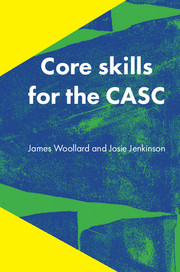Book contents
- Frontmatter
- Contents
- Abbreviations
- Preface
- Introduction
- Part 1 Core skills
- Part 2 Planning your preparation
- Part 3 Putting skills into practice – mock stations
- 10 Mock session 1: Finding your voice
- 11 Mock session 2: Talking techniques
- 12 Mock session 3: Taking control
- 13 Mock session 4: Structured stations
- Resources
- Appendix
- Index
13 - Mock session 4: Structured stations
from Part 3 - Putting skills into practice – mock stations
Published online by Cambridge University Press: 01 January 2018
- Frontmatter
- Contents
- Abbreviations
- Preface
- Introduction
- Part 1 Core skills
- Part 2 Planning your preparation
- Part 3 Putting skills into practice – mock stations
- 10 Mock session 1: Finding your voice
- 11 Mock session 2: Talking techniques
- 12 Mock session 3: Taking control
- 13 Mock session 4: Structured stations
- Resources
- Appendix
- Index
Summary
Station 10
Instructions for candidate
You have been asked to review the ECG of a patient on the ward who is being treated with clozapine. He started clozapine 4 weeks ago and has been breathless over the past few days. He is not diabetic and has no previous medical history. He was diagnosed with schizophrenia aged 20. The medical student with you would like to know what the ECG means.
• Interpret the ECG and present your findings to the medical student.
Instructions for actor
You know that an ECG shows the electrical activity in the heart and that the different patterns show different things. Your knowledge is vague about what each of the different parts mean. You ask the candidate to talk you through how to interpret an ECG and what this ECG shows.
If you feel they do not explain any aspect well, you ask them to explain again until you are sure you understand it.
Station 11
Instructions for candidate
Miss Jones suffered a head injury 2 years ago. Her family have reported concerns that she is behaving oddly. They gave the example that she appears to be gambling a lot and boasts about having had 100 one-night stands in the past year. You have been asked to assess Miss Jones’ cognitive function.
• Perform a focused assessment of the patient's cognitive function.
• You do not have to perform a risk assessment.
Instructions for actor
You are flirtatious and unless the candidate addresses this appropriately you continue to escalate this behaviour. If they address it in an inappropriate manner, then you can become more hostile and less willing to complete the tasks they set you, asking more questions about what the tasks involve.
You have a concrete understanding of the world. So if the candidate asks you what is meant by a phrase such as ‘people in glass houses should not throw stones’, you make a literal interpretation of this and say because they will break windows. Make a similar literal interpretation of alternative phrases they may use.
If they ask you to copy a sequence of hand movements then you cannot do this and repeat one movement over and over again.
- Type
- Chapter
- Information
- Core Skills for the CASC , pp. 61 - 62Publisher: Royal College of PsychiatristsPrint publication year: 2016



